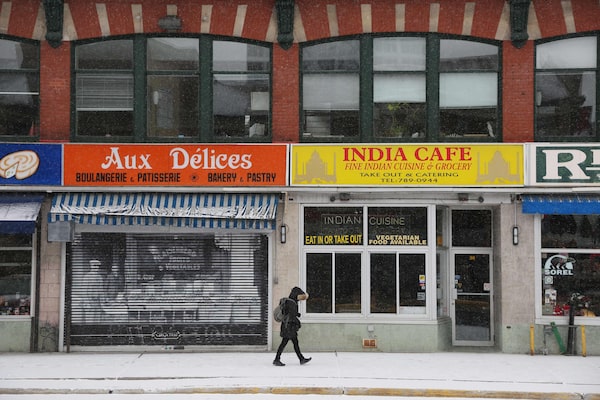
A pedestrian walks along an empty street and closed shops in Ottawa's Byward Market on March 23, 2020.DAVE CHAN/AFP/Getty Images
The Ontario and Quebec governments have announced the near-complete shutdown of their provinces’ economies in a bid to halt the spread of the novel coronavirus.
Ontario Premier Doug Ford announced plans on Monday for non-essential businesses to close across the province, but said food, medicine and “essential products” would remain available.
Urging all Ontarians to stay home, he said the order, issued under the province’s state of emergency powers, would come into effect Tuesday at 11:59 p.m. and last for 14 days, but could be extended if necessary.
“This is not the time for half measures,” Mr. Ford said Monday. “This decision was not made lightly. And the gravity of this order does not escape me.”
Ontario Premier Doug Ford is ordering the closure of all non-essential businesses in the province to help deal with the spread of COVID-19. Ford says the order will be effective Tuesday at 11:59 p.m. and will be in place for at least 14 days. He says he will release the list of businesses Tuesday that will be allowed to stay open, but food will remain on the grocery store shelves and people will still have access to medication.
The Canadian Press
The province released a list Monday evening of businesses permitted to stay open, which included the LCBO and Beer Store.
Quebec Premier François Legault made a similar announcement on Monday, mandating that all non-essential businesses in Quebec were to close Tuesday night until April 13.
Only grocery stores, pharmacies, banks, media and a few other services will be allowed to stay open, Mr. Legault said in Quebec City. Companies that can operate with employees working remotely can also continue, he said.
“Quebec will hit pause for three weeks,” Mr. Legault said. “The faster we can limit contact between people, the faster we can limit the contagion and get back to normal life. I’m asking all Quebeckers to co-operate.”
The directive is applicable to companies in construction and to aluminum smelters as well as other major employers, the Premier said.
There could be exceptions. "We don’t want to create catastrophes, obviously,” the Premier said. “But it includes all goods that are manufactured that are not essential.”
The province released its list of what it considers essential services on Monday evening.
Ontario last week declared a state of emergency – closing bars and forcing restaurants to offer only takeout, while banning gatherings of 50 people or more – as it attempts to slow the spread of the potentially deadly virus COVID-19, which threatens to overwhelm the province’s health system.
“We will not lose this battle,” Mr. Ford said Monday. “We will get ahead of it.”
The Ontario Premier suggested that some construction sites would remain open, but urged workers to leave sites if their employers have not brought in social-distancing measures or are forcing them to make do with unsanitary washrooms.
He said he believes the majority of businesses and the public will comply, but if anyone breaks the order, there will be consequences. Solicitor-General Sylvia Jones said police will be part of the enforcement measures, if necessary.
Mr. Ford also said he doesn’t believe children in the province will be returning to school on April 6, when a two-week closing of the province ordered for after the week-long March Break was scheduled to end. He said his Education Minister would provide further details in the coming days.
“The reality is April the 6th is not realistic right now,” he said. “We are in a state of emergency.”
Meanwhile, Toronto Mayor John Tory also declared a state of emergency on Monday, after the first death over the weekend of a Toronto resident related to COVID-19.
In a briefing live-cast from his condo, where he is in isolation after a recent trip to London, Mr. Tory said there was “no list of things” he was planning to do with his new powers, but that he needs flexibility to deal with a changing situation.
“There are things that come up every morning that you didn’t know were going to be happening that morning, and sometimes the machinery of government is just going to function better in responding to those needs … if we have this declaration in place,” he said.
With a file from Oliver Moore
Prime Minister Justin Trudeau outlined new international travel restrictions for Canada to counter the spread of the coronavirus. Canada will close its borders to non-citizens or permanent residents, with exceptions for key people, immediate family and U.S. citizens. Trudeau also urged Canadians abroad to come home.
The Globe and Mail
Sign up for the Coronavirus Update newsletter to read the day’s essential coronavirus news, features and explainers written by Globe reporters.
 Laura Stone
Laura Stone Nicolas Van Praet
Nicolas Van Praet Jeff Gray
Jeff Gray